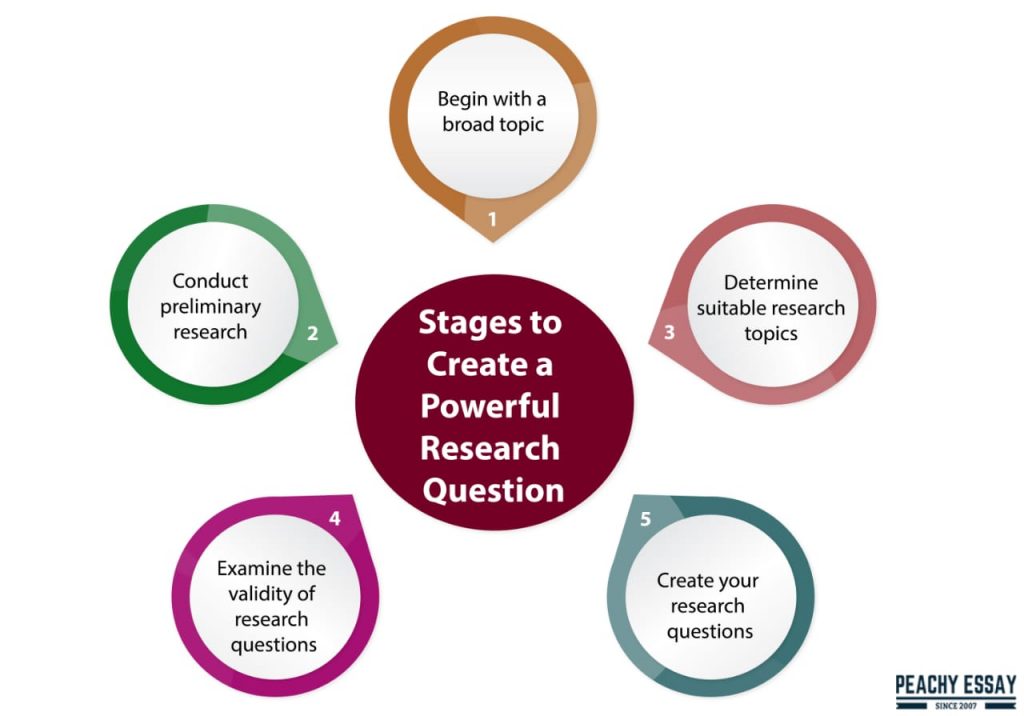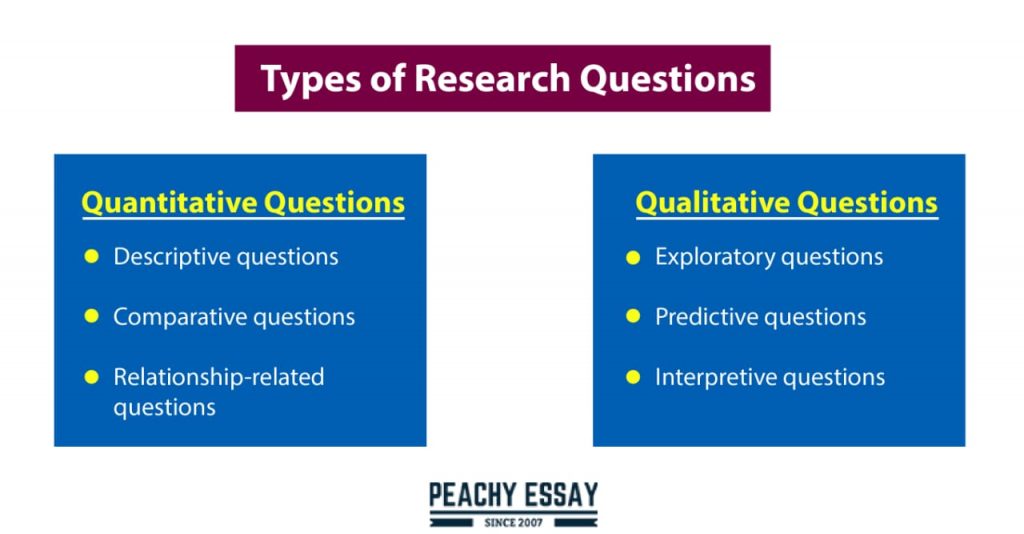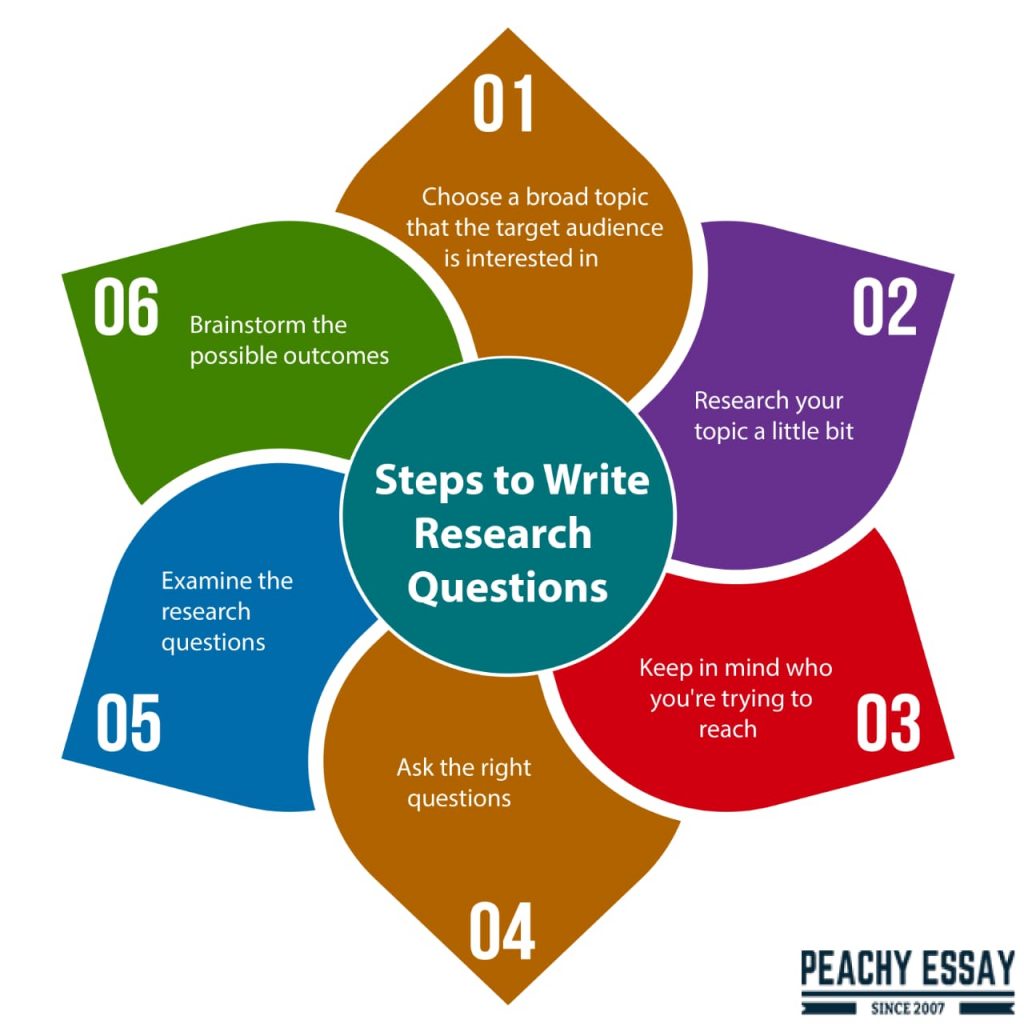You may be required to develop your own research question at some time throughout your degree. The research question identifies the exact issue or problem that will be the subject of your work. It also describes the task that you must do.
A good research question does not have a universal set of characteristics. Priorities and criteria change amongst fields. For example, a decent research question for a business paper will differ from one for a chemistry study.
What Exactly is a Research Question?
A research question is an inquiry intended to be answered through a study or research activity. The question asked here is often relevant to a topic or problem addressed in the study’s conclusion, which is addressed in the study through data analysis and interpretation. In the vast majority of studies, the research question focuses on specifying many aspects of the study, including the targeted population and variables to be explored, as well as the subject matter being studied.
Most often, research questions are founded on research. This means the questions themselves are dynamic, which researchers can adjust as they look into relevant content and enhance their study framework. A major advantage of larger studies is that they focus on a variety of research subjects.
The Importance of a Research Question
Structuring the research issue is intended to ensure that an important and interesting topic is addressed in a specialized investigation field. Guiding frameworks such as research questions act as hypotheses as well. Additionally, these questions demonstrate the study’s boundaries, creating cohesion and consistency.
Also, as the study’s research question influences all other aspects of the investigation, the research question influences the entire study. Research methodology, sample size, data gathering, and data processing are all factors that might be influenced by these questions.
5 Steps to Creating a Powerful Research Question
An excellent research question must be relevant, meaningful, and substantial to society. You could find it challenging to come up with a research question, but it doesn’t have to be impossible. This process has the following stages:

First, begin with a broad topic
A broad topic gives writers a plethora of avenues to investigate their search for a valid research question. Brainstorming and concept mapping are two techniques for breaking down a topic into subtopics and prospective research questions. These methods can help you organize your thoughts to uncover connections and relevant themes within a wide topic.
When looking for a topic, it is best to find one that you are actually interested in because your motivation levels will be affected throughout your research. It’s also a good idea to think about what topics have recently been covered by the research community, as this may affect your paper’s chances of being published.
Conduct preliminary research to understand more about current issues
You can begin preliminary research once you’ve chosen a topic. This basic stage of the research accomplishes two goals. To begin, perform a preliminary review of relevant literature to find issues that scholars and colleagues are currently debating. You’ll acquire up-to-date, useful information about your topic this way.
Second, you can discover current gaps or limitations in your topic’s current knowledge by doing a preliminary review of related literature. With some fine-tuning, you can later utilize these gaps as the basis of your research inquiry.
Determine suitable research topics and narrow down your topic
Once you’ve collected enough knowledge on the topic you want to pursue, you can start focusing on a more specific field of study. Focusing on gaps in existing knowledge or recent literature is one option. This technique comprises formulating research questions based on gaps in the literature and underutilized areas of investigation. Likewise, scholars can choose study questions that extend or enhance existing findings in the literature.
Examine the validity of your research questions
Your preliminary study and assessment of related material will have yielded several intriguing questions that appear to be worth addressing. However, not all intriguing issues are good study topics. Remember that a research question derives its answer or conclusion from an examination of evidence.
Create your research questions
Now that you’ve limited your topic down, you may focus on the language of your research question.
As previously stated, the research topic must specify a specific activity that you will need to execute.
Remember that when deciding on the wording of your question, you must keep the aim of your assignment in mind and that the purpose will vary from discipline to discipline.
A good research question, on the other hand, demands you to analyze an issue or problem. As a result, how and why questions are more beneficial than what or describe questions. You might also use the phrases critique, argue, scrutinize, and evaluate.
To achieve clarity, research questions should be carefully framed. Several frameworks can be used to develop a research topic correctly.
Checklist for Formulating a Good Research Question
Your research article, project, or thesis should be guided by a strong research question. It identifies exactly what you want to study and gives your efforts a clear direction and goal.
Here is a checklist for formulating a good research question.
- Research can be conducted using primary and/or secondary sources.
- Responsibilities are limited by time and practical limits.
- Specific enough to elicit a detailed answer
- Complicated enough that an answer must be developed over the length of a paper or thesis.
- Applicable to your field of study and/or society at large
- Concentrating solely on a single subject or problem
Different Types of Research Questions
From selecting a methodology through reporting, the research process comprises numerous steps. The formulation of research questions, on the other hand, is a frequently overlooked element of the research process. Depending on whether the goal is qualitative or quantitative, several types of research questions should be employed.

Types of quantitative questions
Quantitative research is widely used to set forth specific policies and procedures, such as where, what, when, and how something should be done. Questionnaires for quantitative research are much easier to design since using multiple-choice, single-select, and grid-type questions are more intuitive when you’ve determined what you need to discover. When compared to quantitative procedures, qualitative approaches gather larger data sets of replies, which allows them to conduct more precise studies.
Descriptive questions
This category includes attempting to express an idea or, for example, comprehending how a product is used, such as the frequency, time of day, and purpose of use.
Comparative questions
Similarities and disparities between two groups, concepts, or other variables are compared using this method. Comparing the frequency of use of two things, men’s versus women’s brand preferences, and so on are examples of this kind of inquiry.
Relationship-related questions
Or, in other cases, causal-based questions, which seek to understand how one variable affects another, such as how color influences a person’s desire to buy a particular product.
Qualitative questions types
Qualitative research, as we all know, is less quantitative in nature and focuses on discovering, grasping, and interpreting meaning in relation to a certain goal. The nature of qualitative research questions is substantially vaguer than that of quantitative research questions:
Exploratory questions
This form of inquiry, like descriptive questions in quantitative research, aims to understand something without impacting the outcomes with prior ideas. Questioning how a product is used or what people believe about a given issue are examples of exploratory inquiries.
Predictive questions
These questions seek to understand the intent or future outcome of a topic or action, as the name implies. Asking why a customer acts a certain way or how they would feel if a certain incident occurred is an example of this type of query.
Interpretive questions
Request comments on a certain topic or idea without influencing the outcome. This includes, for example, evaluating new product concepts and determining how message claims are interpreted.
When Should you Use Multiple Research Questions?
A single research question will usually be written in a research paper or essay to guide your reading and thinking. Your thesis statement — the key point or perspective that your article will argue for — is the answer you produce.
Multiple research questions may be present in a larger research effort, such as a thesis or dissertation. Still, they must all be clearly connected and centered on a single research subject.
The Essence of Using Appropriate Research Questions
To conduct research, you need a way to gather accurate data. This channel can generate research questions and assist a researcher in getting their project off the ground. As the research progresses, these questions continue to be shaped by the original ideas, resulting in real research. Developing research hypotheses begins with the formulation of the first research questions.
Questions of research value can be highly subjective. Nevertheless, some researchers may need research questions since they provide insights into important variables in the decision-making process. A research topic, for example, could provide crucial information regarding funding requirements or where to acquire the resources needed to achieve corporate objectives.
How to Develop a Research Question that will Yield Reliable Results
Template questions are far less useful than specific research questions. What kinds of research questions are good? To understand how to write research questions, follow these six steps:

Choose a broad topic that the target audience is interested in:
To entice responses, you must choose an intriguing topic. Respondents are more likely to complete the survey on time if the topics are interesting. The problem should be broad enough to allow you to generate a large number of appropriate research questions. Nevertheless, you shouldn’t restrict yourself to just a few topics as this will impede your ability to collect enough information.
Research your topic a little bit:
You should carry out primary research to determine if there is information available and what may be investigated. In this manner, based on what data is currently unavailable, you may determine which instance is most likely to produce the greatest results.
Keep in mind who you’re trying to reach:
When you narrow down your search to a topic that appeals to a specific group of people, keep your target audience in mind. In this way, your company will collect accurate customer data for research, leading to better products and services for your customers.
Ask the right questions:
Develop an open-ended and closed-ended research questionnaire to get the information that you need. Further, you might get the most information from a response if you frame your questions effectively. For example, in your survey, you may want to place an open-ended question next to a closed-ended question regarding the same product.
Examine the research questions:
It is necessary to assess the effectiveness of your questions once they have been framed and are ready for distribution. If there is room for improvement, these questions should be addressed and reframed.
Brainstorm the possible outcomes:
You can map out the probable responses to your queries after you’ve created relevant inquiries. What kind of responses do you anticipate? Will they back your existing strategy? Considering their responses, what changes can you make to serve them better? This step suggests prospective actions based on the study’s top likely outcomes to everyone participating in the survey and data analysis.
How to Come Up with a Good Research Question
It is critical to generate a strong research question before beginning a new research endeavor. This is an important phase in the research process because it will direct your investigation. As a result, you should not rush to come up with a good research question.
There are various qualities of a well-written research question.
It must be well-defined and devoid of jargon.
The question should be narrow enough to guide your investigation to a logical conclusion. It should summarize a significant issue or subject you intend to research via a literature review, an experimental investigation, or a theoretical exercise.
It must be addressed within the constraints of your time and other resources (e.g., money, equipment, assistants, etc.).
Tips on Research Questions
A problem that has to be solved is the starting point for good research topics.
Customers or employees must be interested enough in the research questions to devote their time. Similarly, your queries should provide data that can be used to improve your company or brand.
You should simplify your queries and make sure they are easy to understand. As a result, respondents remain engaged while also providing the most accurate information possible. In addition, responders can opt-out of the survey or choose a randomly selected answer if they do not understand a problem.


